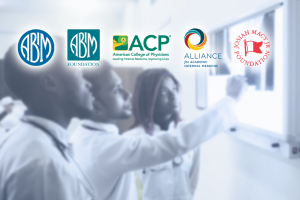Building Trust Through Diversity, Health Care Equity & Inclusion in Internal Medicine Training: Grantee update

In June 2021, the ABIM Foundation – in partnership with the Alliance for Academic Internal Medicine (AAIM), the American Board of Internal Medicine (ABIM), the American College of Physicians (ACP) and the Josiah Macy Jr. Foundation – awarded a total of $287,500 to 32 projects to rebuild trust and address health care diversity, equity and inclusion in medical education and training.
Over the past year, grantees have begun to work toward addressing the root causes of distrust in the provision of care. Each of the projects are well underway in their efforts, and we’re pleased to provide an update on some of the grantees:
The University of California San Diego set out to recruit 20 rising high school seniors from diverse backgrounds who would be first-generation college students and are interested in a medical career to join the Integrate First program. Students participate in the program during their senior year of high school and freshman year of college, and receive intensive support from mentors. Twenty-five rising high school seniors have been identified to join the program, and 20 will be asked to commit to the cohort over the coming weeks. Thirty mentors from UC San Diego School of Medicine and three mentors from ACP California have also been recruited. The Integrate First team has also secured a full-time success coach and a graduate intern to help prepare the cohort for their transition to college.
The University of Maryland is working with Corizon Health, the health care provider for the Maryland Department of Public Safety & Correctional Services, to improve care for incarcerated transgender people. The project aims to increase the number of providers with foundational transgender competent care knowledge and skills by developing new teaching curriculum. So far, grantees have applied for, and secured, five continuing medical education (CME) credit hours for the revamped curriculum, and have extended an invitation for participation to endocrinology fellows through the Association of Program Directors in Endocrinology, Diabetes and Metabolism and Maryland’s ACP chapter. Additionally, six new didactic and interactive learning modules have been created, covering topics that include hormone care, health vulnerabilities, and transgender competent care.
Pre-COVID-19 pandemic, Hennepin Healthcare’s diversity, equity and inclusion (DEI) team established a detailed curriculum for all trainees and faculty to incorporate trauma-informed approaches in their practices. However, due to the pandemic, training was scaled back to prioritize medical students. So far, a virtual reality simulation has been created and implemented to teach the basics of integrating concepts of Trauma Responsive Care into the clinical setting, and six third-year medical students have received extensive training on trauma informed care. To ensure the project’s effectiveness, Hennepin Healthcare plans to elicit input about the curriculum from community members who have experienced health care induced trauma through a series of interviews and observations.
Oregon Health & Science University is studying structural racism experienced by Hispanic patients with diabetes, hypertension, and/or obesity in order to develop an anti-racism and structural competency curriculum for internal medicine residents. By partnering with ¡Salud! and Virginia Garcia Memorial Health Center (VGMHC), thirteen patients were recruited to participate in two separate focus groups. Lessons learned from these focus groups combined with focus groups of residents and faculty, a new structural racism curriculum will be developed and piloted as part of a residency program at Hillsboro Medical Center.
Third-year medical students at the University of North Carolina are using a newly developed health equity dashboard to identify health disparities amongst patients, analyze that data and implement quality improvement projects that promote equity at UNC Health. So far, 53 students have completed a project.
Posted Updated: May 12, 2022

